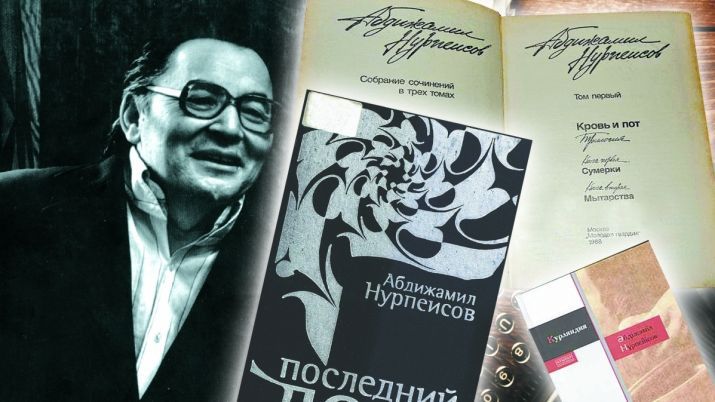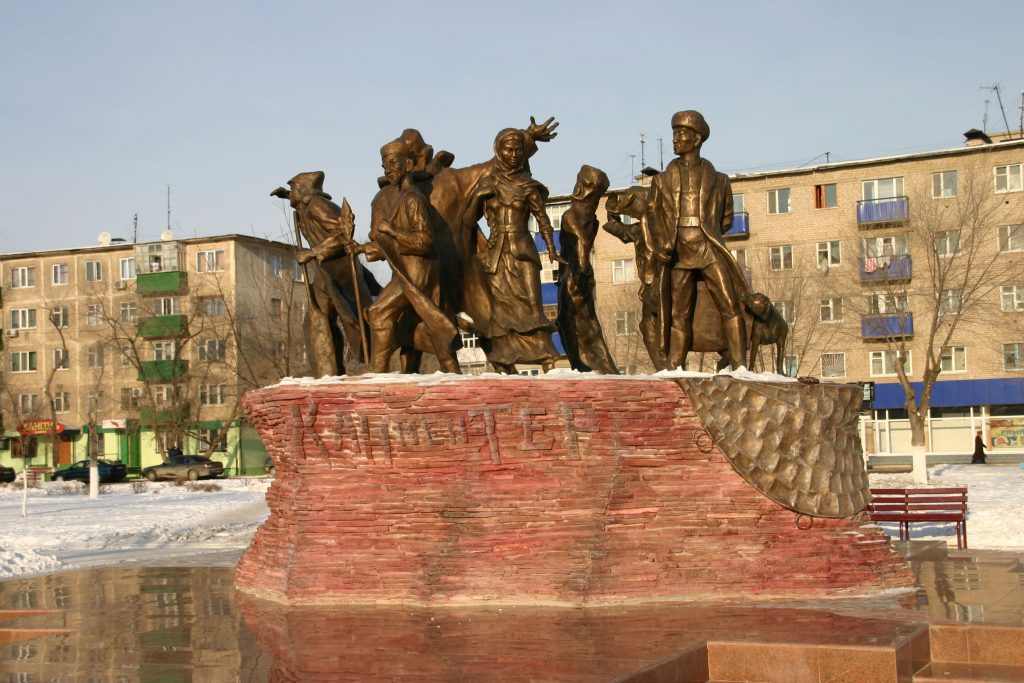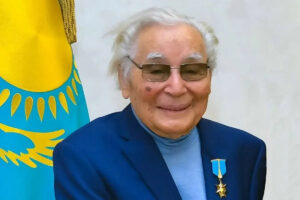ASTANA – Kazakhstan commemorates the 100th anniversary of Abdizhamil Nurpeisov, a prominent Kazakh writer, translator, and public figure, on Oct. 22.

Kazakhstan commemorates the 100th anniversary of Abdizhamil Nurpeisov, a prominent Kazakh writer, translator, and public figure, on Oct. 22. Photo credit: novoetv.kz
Born in 1924 in a small village north of the Aral Sea, Nurpeisov’s early years among the fishermen of this unique region shaped his life’s work and literary inspiration.
During the Second World War, Nurpeisov served as a lieutenant in the Soviet Army. After being demobilized in 1946, he dedicated himself to writing, publishing his first novel “Kurland” in 1950. This novel, based on his war experiences, received widespread praise and earned him the prestigious Zhamby State Prize of the Kazakh SSR.
The trilogy that captured Kazakh struggles
His most significant work, “The Blood and Sweat” trilogy, written between 1958 and 1970, covers the period from the First World War to the aftermath of the Civil War in the former Russian Empire, detailing the lives of Kazakh fishermen on the shores of the Aral Sea.
At a creative meeting with writers in Germany, Nurpeisov shared how the idea for the trilogy originated. He crafted an autobiographical portrait of a young soldier who returned home after the war, having lost his father and brothers. This profound loss transformed his perspective on life. Upon his return, he encountered widowed wives, orphaned children, weary souls, and the overwhelming grief that permeated the community. He witnessed the blood and sweat that had been sacrificed on this land, which compelled him to realize that this was the very essence of the story he needed to tell. On the very day he returned from the front lines, he conceived the title of the book and inscribed it on a small piece of paper.

The monument depicts the heroes of A. Nurpeisov’s novel “The Blood and Sweat”. Photo credit: aktobenasledie.kz
The trilogy, translated into 30 languages and published in millions of copies, gained international recognition. It was adapted for film and theater, and in 1974, Nurpeisov was awarded the Soviet State Prize for literature.
A monument dedicated to the heroes of Blood and Sweat was erected in Aktobe’s Abai Square in 2008, marking the first such tribute to literary characters in Kazakhstan.
Expanding cultural horizons
Nurpeisov also made significant contributions to translation, notably rendering works by Spanish playwright Alejandro Casona, such as “Trees Die Standing”, as well as pieces by Russian literary giants like Anton Chekhov, Maxim Gorky, and plays by Alexandr Sukhovo-Kobylin and Victor Rozov into Kazakh.
From 1963 to 1964, he served as the editor-in-chief of the “Zhuldyz” literary magazine and was a deputy in the Supreme Council of the Kazakh SSR.

Abdizhamil Nurpeisov, a prominent Kazakh writer, translator, and public figure. Photo credit: inform.kz
Throughout the 1970s, he authored several essay collections, including “Reflections”, “Everything Sang in It”, “The Edge of the Blue Mountains”, “Caravans of Memory”, and “My Fate, My Pain – My Aral”.
He also played a key role in preparing and publishing 200 volumes of the World Library, contributing a detailed preface to Mukhtar Auezov’s two-volume work within this series.
In 1987, he released “Duty”, reflecting on the lives of fellow fishermen and the challenging fate of the Aral Sea.
Nurpeisov founded and served as the first president of the International Kazakh PEN Club. In 2000, Tan-Sholpan, a publication of the PEN Club, featured Nurpeisov’s work. He also led the editorial board for this literary and public journal for many years.
His novel-dilogy “The Last Debt”, published in 2000 and addressing the environmental issues of the Aral Sea, won the Sholokhov Prize in 2003. It was translated into German and published in Germany by Dağyeli Verlag as part of the Kazakh Library series. The author’s literary contributions have been translated into numerous languages, including French, German, Spanish, Chinese and Arabic.
Recollections from his friend
Boris Pankin, a Soviet and Russian diplomat and literary critic, remarked on Nurpeisov’s epic nature, both in his writing and persona.
“This duality represents both a gift and a burden, for the shadow of oblivion looms over every artist daily. An epic writer often finds little to ground himself between the release of his substantial works, aside from perhaps the fervor of journalism. Yet, in this pursuit, he speaks not only as an artist but also as a concerned citizen,” he wrote in his essay reflecting on a trip with Nurpeisov in 2003.
Nurpeisov held a deep concern for the auls (villages), recognizing their vulnerability and abandonment to fate.
“I am the flesh of the flesh of this village. The village is my small homeland,” he expressed.
Pankin recalled their journey to the Aral Region, where Nurpeisov had spent his childhood. During the trip, he gazed out at the vast steppes for hours, celebrating every sight of camels, yurts, riders, and flocks that passed by.
“The last time the writer visited these places was a year ago. The deadline seems to be short. But Abike, as his close friends called him, behaved and felt as if he was returning home after a long separation,” wrote Pankin.
Nurpeisov’s deep love and reverence for his people are evident in his writing, with many of his quotes and aphorisms becoming widely known.
Nurpeisov’s vision for Almaty
Although Nurpeisov identified as ‘a young man from a patriarchal Kazakh village on the shore of the shrinking, dying Aral Sea,’ he developed a profound affection for the city of Almaty. In the 1970s, he articulated his vision for the city’s growth in his essay “Incomparable Almaty”, advocating for development that respects nature and cultural traditions.
He believed that any city must evolve, with transformations keeping pace with the times, and that a city’s individuality is expressed through its cultural and architectural trends.
“In the depths of each yard, apricots bloomed exuberantly, and apple trees were shrouded in blue smoke. I thought then that the people living in these small white houses, surrounded by unusual greenery, likely felt like children of nature,” he wrote.
He concluded with a vision of harmony: “The architectural elegance of each newly built structure must be complemented by the beauty of the natural world.”
Nurpeisov died on Feb. 5 in Almaty at the age of 97 leaving behind a rich legacy of literary and cultural contributions that continue to inspire generations.
